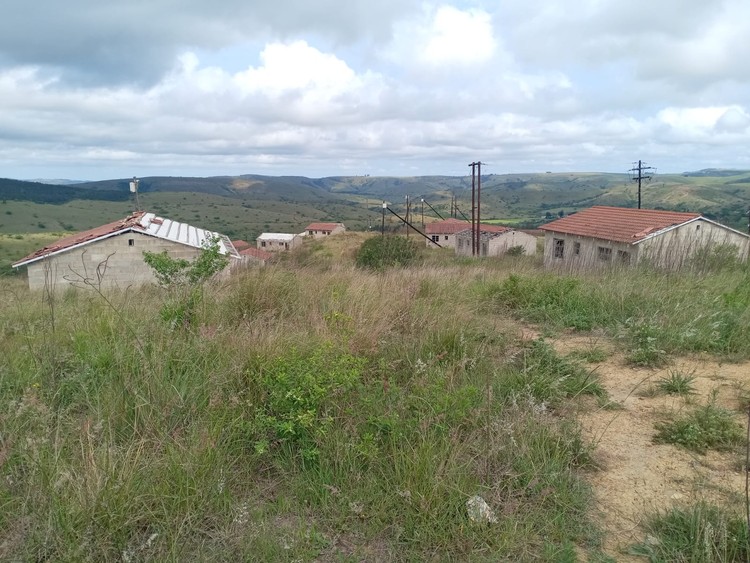Hundreds of incomplete homes stand empty in KwaZulu-Natal housing project
Provincial government has spent more than R101-million
Hundreds of houses at the Thubalethu housing project stand vacant and in disrepair. Photo: Tsoanelo Sefoloko
- At the Thubalethu housing project, meant to build up to 700 houses, hundreds of units still stand empty and incomplete.
- Bulk water and electricity still need to be installed by the local and district municipalities.
- Many houses do not have basic fittings, and others have still not been fully constructed.
- KwaZulu-Natal housing MEC Siboniso Duma promised in February to unblock the project, but little progress appears to have been made. Duma’s spokesperson did not respond to our questions.
Nine months after government officials promised to unblock a multi-million-rand housing project in northern KwaZulu-Natal where hundreds of houses stand vacant and in disrepair, there has been little progress.
In February, KwaZulu-Natal Human Settlements MEC Siboniso Duma promised during a media briefing to restart the Thubelethu housing project near Melmoth, which has cost R102-million to date.
The project first started in July 2016. In total, it was supposed to provide several hundred homes. Some government documents say the project would have more than 500 houses, others say 700.
Provincial government documents show 166 houses were fully completed and handed to beneficiaries, 270 houses are without water, electricity, or basic fittings, and a further 430 houses have only been partially constructed. This is according to Riona Gokool, the DA’s spokesperson for human settlements in the province and a member of the provincial legislature.
Duma said in February that an additional R61-million has been allocated to install bulk water services and R19-million for other water infrastructure. “We have also invested millions towards the provision of electricity. The work has started,” he said.
Duma’s spokesperson, Ndabezinhle Sibiya, did not respond to GroundUp’s questions on the reasons for delays, details of expenditure, or the names of the contractors.
National housing minister Thembi Simelane visited the site in April, together with Duma, who said during a media briefing that the main reason for the delay is that water and sanitation have not been installed, which is the responsibility of the local and district municipalities.
When GroundUp visited the site in early November, there did not appear to be any progress on water and sewerage infrastructure. Electricity poles have been installed, but there are still no cables or connections.
“I was hoping that when the houses were allocated, I would have one too because I’m a beneficiary,” Thubulethu resident Niphile Biyela told GroundUp “Many of my neighbours who applied with me have passed away.”
Gokool said the King Cetshwayo District Municipality and Mthonjaneni Local Municipality are “bottlenecks”, delaying water, sewerage, electricity and road access.
Additional funding is also needed for the bulk water provision, including for retaining walls and a bigger reservoir, Gokool said. Because the built houses are vacant and vulnerable to vandalism and theft, contractors have not installed fittings.
King Cetshwayo District Municipality spokesperson Thami Shangase told GroundUp that a contractor is installing the bulk water supply. R9.5-million has been allocated for this. He did not respond when we asked for the name of the contractor.
Mthonjaneni municipal manager Ziphozenkosi Mthethwa told GroundUp that the municipality is ready to connect electricity once all the houses are completed. He added that the municipality is building a substation to ensure all residents in Thubalethu have access to electricity.
Tuso Zibula, spokesperson for the national department, at first agreed to help us with answering the questions. However, he ended up referring us back to the provincial department.
Support independent journalism
Donate using Payfast

Don't miss out on the latest news
We respect your privacy, and promise we won't spam you.
© 2025 GroundUp. This article is licensed under a Creative Commons Attribution-NoDerivatives 4.0 International License.
You may republish this article, so long as you credit the authors and GroundUp, and do not change the text. Please include a link back to the original article.
We put an invisible pixel in the article so that we can count traffic to republishers. All analytics tools are solely on our servers. We do not give our logs to any third party. Logs are deleted after two weeks. We do not use any IP address identifying information except to count regional traffic. We are solely interested in counting hits, not tracking users. If you republish, please do not delete the invisible pixel.

